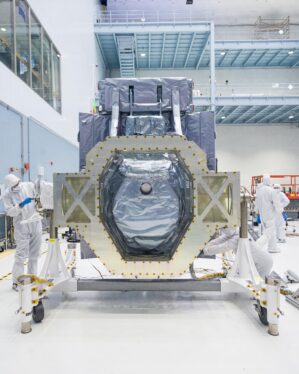The NASA Science Mission Directorate (SMD) instituted the Entrepreneurs Challenge to identify innovative ideas and technologies from small business start-ups with the potential to advance the agency’s science goals. Geolabe—a prize winner in the latest Entrepreneurs Challenge—has developed a way to use artificial intelligence to identify global methane emissions. Methane is a greenhouse gas that significantly contributes to global warming, and this promising new technology could provide data to help decision makers develop strategies to mitigate climate change.
SMD sponsored Entrepreneurs Challenge events in 2020, 2021, and 2023. Challenge winners were awarded prize money—in 2023 the total Entrepreneurs Challenge prize value was $1M. To help leverage external funding sources for the development of innovative technologies of interest to NASA, SMD involved the venture capital community in Entrepreneurs Challenge events. Numerous challenge winners have subsequently received funding from both NASA and external sources (e.g., other government agencies or the venture capital community) to further develop their technologies.
Each Entrepreneurs Challenge solicited submissions in specific focus areas such as mass spectrometry technology, quantum sensors, metamaterials-based sensor technologies, and more. The focus areas of the latest 2023 challenge included lunar surface payloads and climate science.
A recent Entrepreneurs Challenge success story involves 2023 challenge winner Geolabe—a startup founded by Dr. Claudia Hulbert and Dr. Bertrand Rouet-Leduc in 2020 in Los Alamos, New Mexico. The Geolabe team developed a method that uses artificial intelligence (AI) to automatically detect methane emissions on a global scale.
As global temperatures rise to record highs, the pressure to curb greenhouse gas emissions has intensified. Limiting methane emissions is particularly important since methane is the second largest contributor to global warming, and is estimated to account for approximately a third of global warming to date. Moreover, because methane stays in the atmosphere for a shorter amount of time compared to CO2, curbing methane emissions is widely considered to be one of the fastest ways to slow down the rate of global warming.
However, monitoring methane emissions and determining their quantities has been challenging due to the limitations of existing detection methods. Methane plumes are invisible and odorless, so they are typically detected with specialized equipment such as infrared cameras. The difficulty in finding these leaks from space is akin to finding a needle in a haystack. Leaks are distributed around the globe, and most of the methane plumes are relatively small, making them easy to miss in satellite data.
Multispectral satellite imagery has emerged as a viable methane detection tool in recent years, enabling routine measurements of methane plumes at a global scale every few days. However, with respect to methane, these measurements suffer from very poor signal to noise ratio, which has thus far allowed detection of only very large emissions (2-3 tons/hour) using manual methods.

The Geolabe team has developed a deep learning architecture that automatically identifies methane signatures in existing open-source spectral satellite data and deconvolves the signal from the noise. This AI method enables automatic detection of methane leaks at 200kg/hour and above, which account for over 85% of the methane emissions in well-studied, large oil and gas basins. Information gained using this new technique could help inform efforts to mitigate methane emissions on Earth and automatically validate their effects. This Geolabe project was featured in Nature Communications on May 14, 2024.
SPONSORING ORGANIZATION
NASA Science Mission Directorate





